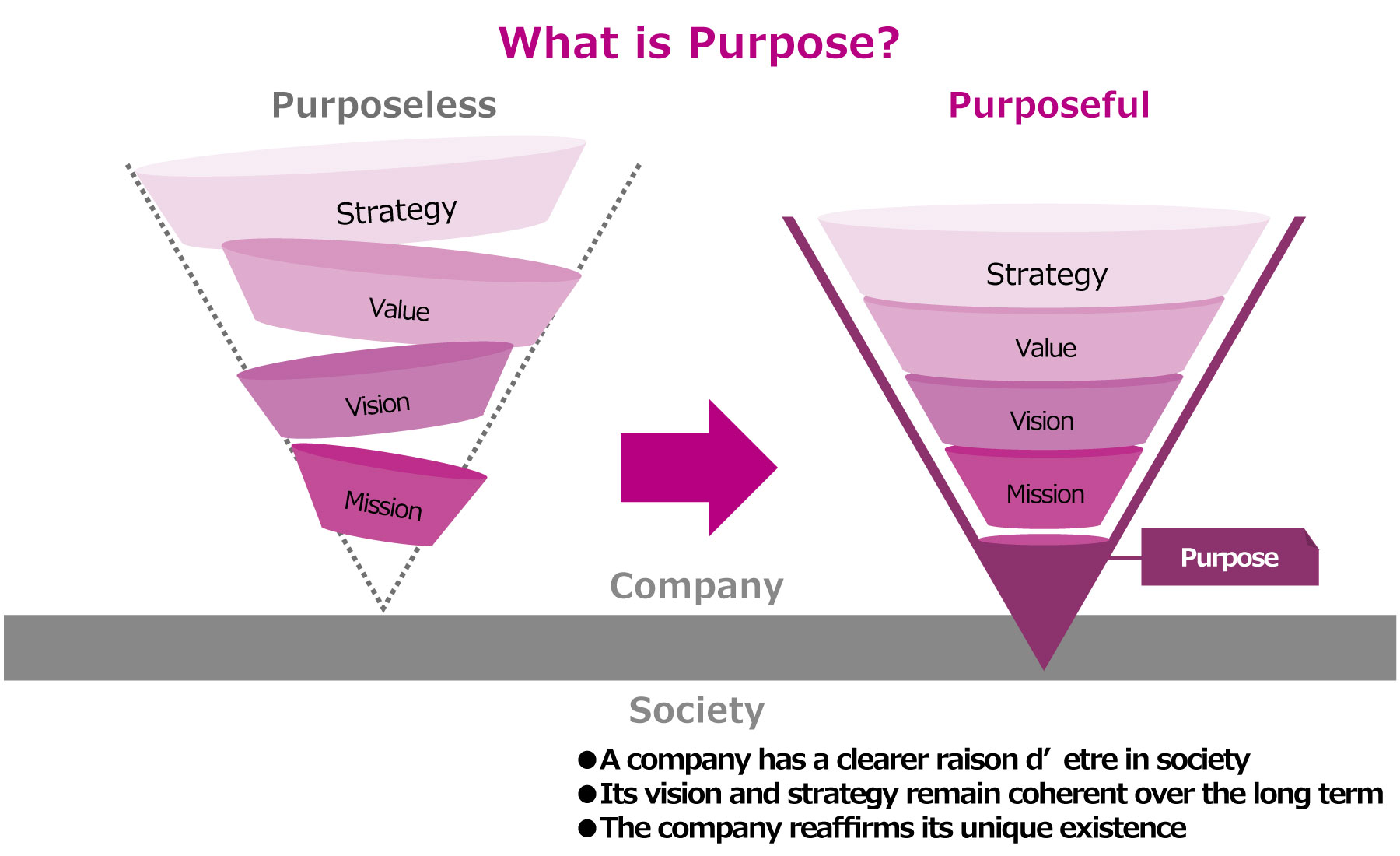
Purpose-Focused Management Leads to Swifter Strategy Execution
With a spotlight shone on sustainability management, it is more important than ever today to rethink and redefine corporate purpose (a company’s reason for existence in society), say NRI’s Eiko Ibuki and Yukito Furunishi. We asked these veterans in the field of sustainability and organizational development what corporate purpose is and why businesses need to focus on their purpose.
What is corporate purpose?
The word “purpose” is gaining attention as a corporate management concept and refers to a company’s “unwavering reason for existence in society”. How is “purpose” different from conventional philosophy (mission) or vision? “It is closely associated with the notion of ‘being a member of society’ and, going back to square one, it redefines the way of individual companies, their dignity, raison d’etre, and the value they bring to society; it is also deeply related to conventional philosophy and vision,” Ibuki says.
Furunishi adds:
“Some companies include purpose in their mission and state it explicitly, while others that do not include it interpret their mission from a social aspect and separately clarify it as purpose. Purpose is thought to indicate the type of member of society that a company wants to be—a concept with a strong third-party perspective. Redefining this purpose brings advantages, such as being able to maintain coherency in a company’s vision or strategy over the long run, or to reaffirm internally and externally your company’s unique existence in the world.”

Purpose serves as a strong force enabling companies to flexibly respond to changes in social developments
Some companies have already included purpose in their philosophy, but purpose came to draw attention particularly in recent years amid the growing trend of sustainability-focused management, and Ibuki explains the background to this as follows:
“In recent years, businesses that neglect to consider their relations with society just don’t work, and expectations that companies will strive to address social issues are growing as ever. Amid these changes, companies are finding the managerial significance of understanding their reason for existence in society once again.”
Furunishi adds as follows.
“Companies are increasingly seen as members of society, and it is becoming more important for them to engage in business and communication based on their purpose. By redefining their purpose which had been hidden in the organization for many years and engaging in communication, companies will be able to gain greater trust and empathy from stakeholders, both internal and external. As a result, this will enhance the unifying force of the organizations from the perspective of employees who are responsible for implementing strategies, and this in turn will help them understand the significance of working and feel proud of that.”
Widespread understanding of purpose leads to swifter execution of strategy
What are the benefits of defining purpose for companies that already have their philosophy or vision? One benefit is swifter implementation of strategy, Ibuki says.
“When a company’s reason for existence is defined, it will become clear to internal and external stakeholders, including employees, why they are part of the company. They’ll feel proud of working, the organization will have a greater unifying force, and communication will increase. As people understand one another better, senior management will be able to make decisions more smoothly and employees will learn about them more quickly, and this will lead to quicker execution of strategies, we think.”
Furunishi points out that millennials, who joined the workforce in the 2000s, will be a key element here.
“One characteristic of the millennials is that they are highly sensitive to sustainability. By showing to this generation the value of their being in society, companies will be able to retain top talent, and in terms of marketing, they will be able to appeal more to customers.”
Social transformation starts with purpose
Companies and organizations are not the only ones that should have purpose; it is important for individuals to have a purpose as well. “When individuals, organizations and companies have purposes that agree well with one another, companies and individuals will be able to enhance their performances,” Ibuki says.
“When they think about purpose, companies, organizations and individuals will have a clear understanding of what they need to do. We hope that our consulting service and support for companies through purpose will lead to a step toward a better society,” Furunishi remarked in closing.
NRI’s Principal
NRI’s Principals have high level of expertise in specific markets or solutions.
As leading consultants, they have been leading innovations for society and NRI’s clients.
NRI’s Principals create new businesses, commit to clients and have responsibilities to solve our client’s issues.
Profile
-
Eiko Ibuki
-
Yukito Furunishi
* Organization names and job titles may differ from the current version.